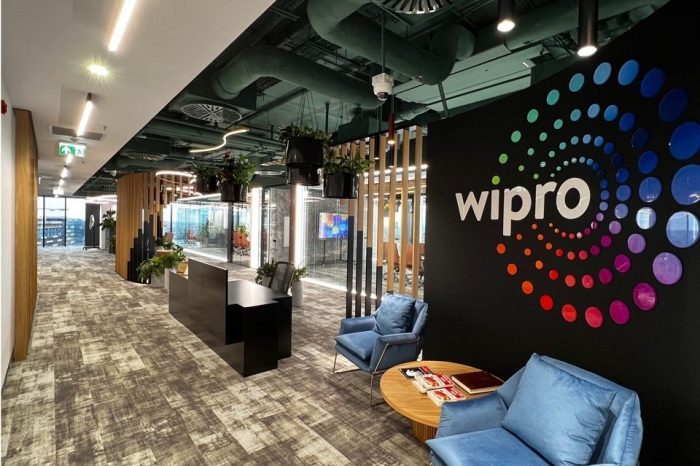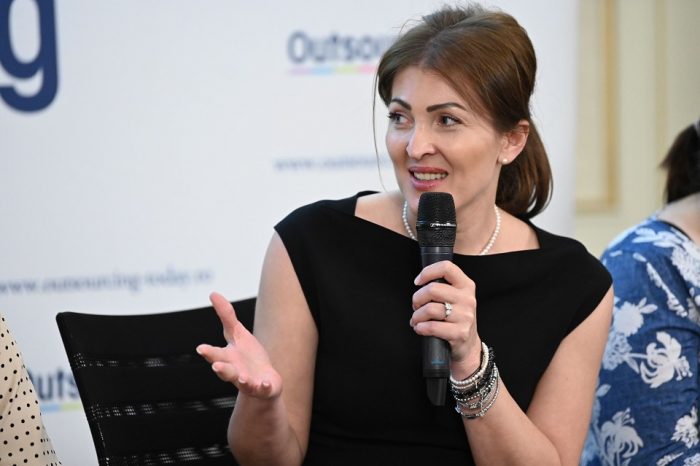Irina Butnaru, GM of Wipro Romania: Companies need their people to evolve from execution towards a strong business acumen

The world is in continuous transformation, at all levels and layers. This also replicates in business. The past years, as well the current year, with their wave after wave of changes, challenges and global crisis, had a strong impact on businesses, work landscapes and people’s mindsets. In this context, the fundamental landmark and the silver lining remains the signal and the conduct of leaders.
The Diplomat-Bucharest talked with IRINA BUTNARU, General Manager of WIPRO Romania to learn in more depth about several aspects that hold the current business talks agenda: past challenges, expectations of the future, the work approach and the current meaning of leadership.
Leading by example
“Lead by example” is something that defines the leadership vision of Wipro. This is purely about instilling credibility, and it is the liaison of habits that structures Wipro’s values and habits – that I will detail further below. Leading by example is incredibly powerful and effective in earning and forwarding trust and credibility across the company’s people. So, Wipro’s habits are a guide of conduct and actions for all employees, no matter the professional area, level or title.
The first habit is about being passionate about clients ‘success by demonstrating stewardship at all times. This means aligning our drive to succeed with our clients’. We collaborate to sharpen our insights and amplify this success and we execute with excellence.
The second habit is treating each person with respect and being responsive. No need for further explanation that this is intrinsic and common-sense based. At Wipro, we treat every human being with respect. We nurture an open environment where people are encouraged to learn, share and grow. We embrace diversity of thought, of cultures, and of people.
The third habit refers to building the mindset of global and responsible. This translates in being responsible citizens of the world and energized by the deep connectedness between people, ideas, communities and the environment, all from a global and responsible perspective, by always communicating and embracing diversity and who we are as a culture.
Finally, the fourth habit refers to unyielding integrity to build trust at each level and action. Integrity is our core and is the basis of everything. It is about following the law, but it’s more. It is about delivering on our commitments. It is about honesty and fairness in action. It is about being ethical beyond any doubt, in the toughest of circumstances. It’s about building trust in every relationship.
But not only this. I was impressed when onboarding Wipro by the genuine humbleness that leaders show and by their willingness to offer support, besides the trust they bestow the newcomers in the company. Maybe one of the greatest and the most powerful values embraced at Wipro is that of respect for people and putting people first. The Diversity and Equity aspects are fundamental and innate within the company. As the business is structured, it is already known that 67 per cent of the company’s profit goes to Azim Premji Foundation. So, the business philosophy considers human-wise values being more important than profit. The money also goes to supporting the environment-based actions in India and globally and this long-term thinking on sustainability is something very present at Wipro. Every contract signed encompasses sustainable aspects and the vision and acts for a long-term partnership.
People in empowering connection
The pandemic changed everything in the mindset of employees and companies in terms of addressing the matter of work regarding workspace, expectations, processes, preferences and options. For companies with a global reach such as ours, the digital approach is vital. In this sense, we have developed a unique digital space for all employees in Wipro where they can stay connected, share information, get in touch with Wipro’s news and operations and it also acts as a transparent and dynamic platform for offering feedback and personal motivation, along with acknowledgment and awarding.
What is interesting about how Wipro addresses the matter of acknowledgement and empowering people is that of rewarding the employees for small actions. We have noticed that, especially for the young generations, it is important to feel that they are appreciated for who they are. The young generations need to know they have an impact and are acknowledged for this. The platform is designed around a philosophy enabled by different technical features where people are rewarded and acknowledged by their colleagues for a positive behavior or an action that had a positive impact within the company. Also, one of the main milestones of Wipro’s digital space is that it follows the entire lifecycle of an employee, right from the time they first onboard with Wipro and all through the career stages, until the offboarding. In a sense, this digital approach and seamless user experience enabled not only a more well-organized and efficient work habits, but it also enabled the closeness and stay-in touch feeling for people working remotely from different corners of the world – a platform where people come together and feel they are part of a team.
The tools are also created to help and enable people to develop professionally. Besides the necessary technical skills, what we have seen is the people’s need to stronger develop their business acumen.
The work is moving away from its executional function. The analytical skills are highly needed
We developed platforms and systems and we are good at executing processes, but we feel the need of building the middle layer – people who are capable of understanding the business as process and the platforms’ utility and functionality. As mentioned before, there is a tendency of reducing the number of platforms and applications for different business areas or processes in the company and we need the business designers or business analysists that can understand, analyze and translate to tech developers the expectations and needs specific to a business area or process. We will need this middle layer between the business and IT more and more, specialists who understand processes and systems and can suggest a simple, clear and efficient solution to be developed by the IT departments.
The competitional advantage of the companies in this part of the world should make the transit from excellent execution towards the more value-added and refined skills of analytical thinking
People need to make the transition from great executors to efficient thinkers and analysts. This also provides great opportunities for them to develop, because there is a lot of room for this and it is also a prerogative for those markets, companies and people who will be relevant for the future work landscape. And this is something you learn it by doing it. In Wipro, we do this by exposing people to different processes and platforms from different business areas. Because, if a process in HR or procurement may be the same for business, the client and industry’s policies may primarily differ. And this wide and more complex exposure helps people gain a more conceptual approach and a more analytical and perceptive vision. We don’t have this kind of curricula in schools and universities and people don’t learn to think conceptually. So, we have to build it. How do we do it? At Wipro, having a diverse clients pool from ‘diverse industries, we are now reorganizing them based on practice area. By doing so, we will gain a wider perspective on a practice scaled and applied to different industries and this will result in a most proficient and solid expertise brought in the service of our clients. Starting next year, we will launch a program based on career path and areas of practice, because we have a lot of people who have accumulated strong expertise and can now work with conceptual aspects of a business.
60% people working in Romania fear that they are not ready for the future, according to a well-known survey. And this result is part of our fault as a society also. I believe it is our duty as company to prepare the people through upskilling and reskilling exercises. The work is moving more and more away from the execution part and the future work roles will have to be agile, flexible and adjustable to swapping tasks and more and more complex needs of the clients.
Addressing the challenges across industries: Flexibility & risk management
In 2023, we have seen the highest need for flexibility ever. Companies needed to ramp down or up in a fast manner. This year, the ups and downs of entire industries were happening like never before. For 2024, flexibility remains in place and this also triggers the need for risk management.
The past years crisis generated serious concerns and risk mitigations needs for all companies across all industries. The challenges and business distress across all industries resulted in diverting budgets needs to the most impacted business lines and applying a more cautious business development strategy. We have seen this in the automotive industry which has slow downed from different reasons, one of the main impactful being the challenges witnessed in the production and the supply chain. However, besides this, the slowdown has also been noticed in the tech area – the software development and the engineering. Another challenged business area has been the apps & data, where we have seen the diminishing appetite for the development of new platforms and systems, but rather maintaining and reducing the number of applications used by the customers. In the past years, the IT&C industry reached an impressive growth and the volume of developed apps and all sort of tech-based platforms was enormous. This also came with an overwhelming challenge for companies to integrate and make the best used of them in their operations. Probably now it is beneficial to run some analysis and discern among them in terms of efficiency and best use and value. The digital space provides, beside visibility and transparency, a tool that is inspiring, motivating and empowering people.
The risk mitigation associated with the cyber security will grow in 2024
This year, we have achieved growth mainly through the BPO operations, particularly through the consumer business area. There are also new areas of business where our customers asked for specific solutions to respond to the new business needs generated for instance, by the changing in European legislation or by the tremendous advance of social media. A couple of years back, we didn’t see the content moderation reaching such a scale of functionality and we needed to address it proactively and proficiently. From a financial perspective, what we observed is that businesses needed more control and risk mitigation and we have been working with our customers to identify their needs, options and come with the best solutions to address the specific needs of risk management. For the next year, besides maintaining and accelerating the growth of the mentioned business areas, we anticipate a serious growth coming from the cyber security needs and solutions. The high-speed development of online applications, platforms and operations, the risks associated with this will provide for a higher need for preventive cyber security solutions.
















